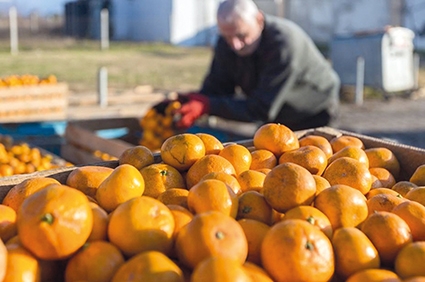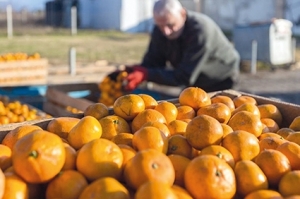New Research Reveals Regional Crops are Far from Export-Ready
PMC Research has published new reports on value chain analyses conducted as part of a European Union-funded project titled “Civil Society Organizations Supporting Free Trade with Europe.” The project was implemented by People in Need, a Czech non-governmental organization, in partnership with PMC Research, the Rural Communities Development Agency, Atinati, Bridge, and Georgian Alliance on Agriculture and Rural Development.
The project looked at three regions of Georgia: Kvemo Kartli, Mtskheta-Mtianeti, and Adjara. Teams visited each region and met with civil society organization (CSO) representatives, experts, local action groups and individual farmers. The project aimed to equip CSOs with the tools and knowledge to conduct their own research studies in the future in the agro-food sector, with an eye toward developing the capacity of local farmers to be able to benefit from the DCFTA by exporting their produce to the European market. In 2014, the EU created a Deep and Comprehensive Free Trade Area in Georgia as part of its Association Agreement. The DCFTA came into force in June 2016, and Georgia, along with Ukraine and Moldova, was granted a 10-year transitional period to establish a full free trade regime.
To teach by example, and begin the process of thinking more deeply about the possibilities and challenges of individual crops, researchers selected one crop in each region with the help of targeted stakeholders. They analyzed the value chain of each crop to determine the potential for its production and processing industry domestically and export potential to the EU. In Kvemo Kartli, researchers selected broccoli to analyze, in Mtskheta-Mtianeti, raspberries, and in Adjara, mandarins. The subsequent papers published described the crops’ value chains from producer to consumer, identified the chains’ limitations and advantages, and presented recommendations for developing the crop and improving economic conditions.
As noted in the Adjara report, food and agriculture make up 14-16% of Georgia’s GDP, and “is particularly important for the development of the country’s provincial regions, where the majority of the population is employed in this sector, and agriculture represents one of the main sources of income for many families.” Approximately 30% of Georgia’s exports are agricultural products. The Mtskheta-Mtianeti report elaborates, “around 43% of the Georgian territory is designated for agricultural purposes...The majority of the people employed in agriculture are forced to work in that field due to lack of alternatives. They are not market-oriented, and they consume a large part of their produce themselves.”
In Kvemo Kartli, researchers determined that the soil and climate are favorable for broccoli production, and global demand is growing along with production – an average of 2.9% growth per year. “Although horticulture in Kvemo Kartli is mainly represented by potatoes, grains and vegetables,” the report reads, “the region also produces broccoli, and ... there are even villages where commercial production of this plant constitutes the main source of income for farmers.” The main takeaway of the report is that Europe is one of the world’s major producers of broccoli, and “under the current conditions of productivity,” Georgian broccoli would struggle to be competitive “in the European Union, as certification [and transportation costs] would lead to the costs exceeding the sales revenues.” There is, however, the possibility to substitute imported broccoli with locally grown produce, and Kvemo Kartli has the lowest cost of production in Georgia.
Farmers began growing raspberries in Mtskheta-Mtianeti three-four years ago. Both in Georgia and Europe, demand for the fruit is growing, and, domestically, demand exceeds supply, providing an attractive gap for farmers to target. The main obstacles identified in the report are risks from bad weather, insects, and disease, a lack of knowledge, a limited specialized labor force, and a lack of affordable storage and preservation facilities. Researchers recommended prioritizing expanding production and developing more freezer facilities to enable local raspberries to be sold year-round, substituting off-season imports and demanding higher prices. They also recommended more access to trainings and informational resources for farmers. Regarding the fruit’s export potential to the EU, there are several hurdles, including the minimum volume required by European importers, and requirements for homogeneity. Supporting the export potential is the fact that the harvest begins much earlier in Georgia than in Europe, and that production costs are lower.
In Adjara, mandarin plantations cover approximately 4,800 hectares and have more than 3 million mandarin trees. There is not currently a realistic possibility for export, however, as Georgian mandarins are far from European standards of quality and the logistics networks required to get there have not been adequately established, researchers explain. One interesting problem regarding the European market is that EU countries produce a variety of mandarin called clementine, whereas Georgia grows the satsuma cultivar. Clementines set themselves apart “through [their] more attractive visual appearance, sweeter taste and a thicker peel...European consumers are used to the clementine and sweeter citrus fruits. However, as Europe is seeking to reduce per capita sugar consumption on the continent, the Georgian satsuma will have an opportunity to establish itself on the EU market.” The paper also presents the staggering figure that mandarin yields of existing farms could be increased by up to 300% if farmers adopt more advanced plant maintenance techniques. The study also notes the potential for agro-tourism in the region.
While the reports each conclude that the possible export of the crops in question to the European market is far from realistic under current conditions, several strategies are presented in each for tackling the obstacles to take full advantage of the opportunities the DCFTA offers Georgian farming communities if resources can be levied appropriately.
The analyses are available in English at www.research.pmcg-i.com
PMC Research is the research arm of Tbilisi-based Policy and Management Consulting Group (PMCG), an international development consulting company focused primarily on transitional and developing countries.
By Samantha Guthrie











